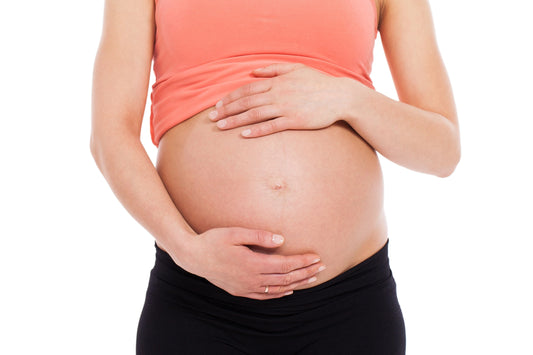Dear mum, are you suffering from swollen, painful, heavy legs and maybe even from a tingling sensation? Don't worry, this is a common complaint from mums-to-be during the third trimester of pregnancy.
Swollen legs, as well as swollen hands and feet, mainly occur due to the changes and the strain our body undergoes as a result of pregnancy: blood flow increases by 20% in order to feed the baby. In addition, kidneys filter proteins and salts less efficiently through the urine, which contributes to swelling in the lower part of the body.
How can I relieve swollen legs during pregnancy?
Let’s take a look together in the following paragraphs.
Leg muscle pain during pregnancy
Muscle and joint pain during pregnancy is also quite common. It can occur not only in the legs, but also in the feet, pelvic and back areas.
The cause lies in the physical changes our body is undergoing. Weight gain and a growing bump, as well as increased water retention, can all lead to strain on the nerves and joints. In addition, a woman’s centre of gravity shifts, and internal organs are displaced as the body adapts to accommodate the additional weight of a developing baby.
These are reasons why you may experience aches, pains and even cramps throughout pregnancy. We recommend drinking plenty of water and eating foods which are rich in potassium such as lemons, bananas, melon, watermelon, salad, and parmesan cheese.
Causes of swollen legs during pregnancy
About 70% of expectant mums suffer from swollen legs, varicose veins, and water retention. The causes stem from hormonal and vascular factors.
- Certain hormones such as oestrogen and progesterone are produced in greater quantities during pregnancy to prepare the body for childbirth. As more fluid accumulates in the body, tissues become softer and joints more elastic. However, fluids also tend to build up in lower extremities.
- In addition, as gestation progresses, the liquid component of the blood (plasma) increases in relation to the protein component.
- Blood vessels dilate to facilitate the passage of fluids from the blood to surrounding tissues.
- The weight of the uterus increases as the baby grows, squeezing the veins and making it difficult for blood to flow from the extremities to the heart.
These can all trigger swelling of the legs, hands, and feet, especially during the last trimester of pregnancy. Swelling is more noticeable during summer months as heat dilates blood vessels and makes circulation even worse.
12 Effective remedies to relieve swollen legs during pregnancy
There are several factors that can help make a difference to swelling during pregnancy, such as diet and physical activity. There are also some simple measures you can take to relieve heaviness. We list them below:
- Pay attention to your sodium intake by trying to use as little salt as possible in your food.
- Sitting for long periods of time in the same position, such as when at work, encourages fluid build-up in feet, ankles, and legs. Try to stand up and stretch your legs from time to time.
- Standing still in the same position is also not good for circulation in your legs. If it can't be avoided, then try to take a break and sit down every now and again.
- Potassium is very important during pregnancy. You should eat potassium-rich foods such as sweet potatoes, bananas, green leafy vegetables, salmon, and yoghurt.
- Drink at least two litres of water a day.
- When resting, elevate your legs by placing a pillow underneath. Your Koala Hugs pillow is ideal for this!
- Go for a daily walk, avoid the hottest hours of the day, and don’t overdo it.
- If it's very hot and you're lucky enough to live near a beach, take advantage of being able to walk along the seashore in the water – there’s nothing better.
- A little bit of light physical activity, without overdoing it and only doing activity, which is recommended during pregnancy, can only bring benefits. The best options are swimming, aqua gym, and walking.
- There are various exercises you can do to improve blood circulation, such as ankle circles and alternate toe and heel lifts.
- Maintaining a healthy diet low in sugar and fat is very important for the health of both mother and baby, and it also helps reduce leg swelling.
- Massage your legs with citrus essential oil to boost circulation. It promotes the elimination of excess fluid and helps your legs feel lighter.
Swollen legs in pregnancy: when to worry?
Swelling in the lower part of the body is fairly common during pregnancy. Although it may be bothersome, it’s usually not worrying in itself.
If swelling appears together with other symptoms, then it may become a cause of concern. Red flags may include: high blood pressure, swelling in just one leg or in one particular area of the leg, swelling in hands, swelling that appears suddenly, confusion, altered vision, headache.
These signs may indicate a serious health condition. Therefore, you should contact your doctor immediately.
Despite the fact that swollen legs during pregnancy is usually nothing to worry about, it can still be quite bothersome and may impact on how we feel about ourselves.
This is why we've recommended a few different ways you can help relieve swelling. Try them out for yourself and discover the benefits they bring!








